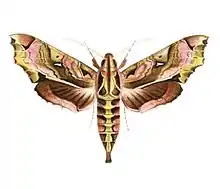Hemeroplanes ornatus
Hemeroplanes ornatus is a species of sphinx moth native from Mexico through northern South America. The species was first described by Walter Rothschild in 1894. [2]
| Hemeroplanes ornatus | |
|---|---|
 | |
| Scientific classification | |
| Kingdom: | Animalia |
| Phylum: | Arthropoda |
| Class: | Insecta |
| Order: | Lepidoptera |
| Family: | Sphingidae |
| Genus: | Hemeroplanes |
| Species: | H. ornatus |
| Binomial name | |
| Hemeroplanes ornatus Rothschild, 1894[1] | |
| Synonyms | |
| |
Description
H. ornatus is mainly light brownish gray with green, pink, and dark brown markings. In the forewing cell, there is a short silver mark. There is a greenish-brown stripe running the length of the abdomen, with three yellow lateral stripes on the second, third, and fourth segments.[3]
Life cycle
The female releases pheromones to attract males. The caterpillar is green, camouflaged against its host plant Fischeria panamensis.[2][4] However, when disturbed, the caterpillar hangs from the vine with his prolegs and puffs up its head and thorax. The underside of its body is brown, and it has a pair of false eyes on the thorax, making it look like a small snake. It will move back and forth and strike at predators.[4][5]
References
- "CATE Creating a Taxonomic eScience - Sphingidae". Cate-sphingidae.org. Archived from the original on 2012-11-10. Retrieved 2011-10-19.
- Bill Oehlke. "Hemeroplanes ornatus". Archived from the original on 27 August 2011. Retrieved 20 October 2010.
- Rothschild, Lionel Walter (1894). Novitates Zoologicae (1 ed.). British Museum (Natural History). p. 74. Retrieved 21 October 2010.
- Ricklefs, Robert E.; Miller, Gary Leon (2000). Ecology (4 ed.). New York, NY: W. H. Freeman and Company. p. 124. ISBN 0-7167-2829-X. Retrieved 21 October 2010.
- Sullivan, Evelin (2001). The Concise Book of Lying. New York, NY: Picador. p. 278. ISBN 0-312-42047-1. Retrieved 21 October 2010.